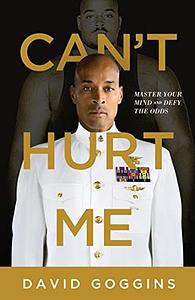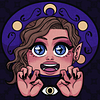Take a photo of a barcode or cover
hopeful
informative
inspiring
reflective
medium-paced
inspiring
medium-paced
hopeful
inspiring
medium-paced
Very inspirational with vivid illustrative stories and tangible takeaways to show someone how to reshape their lives to live up to their full potential.
challenging
emotional
hopeful
informative
inspiring
reflective
sad
medium-paced
inspiring
tense
fast-paced
Starts off very strong and inspiring, then gets bogged down in little details of his life. Overall great book and story, wish it finished how it started
medium-paced
inspiring
slow-paced
After a friend gifted me this book two and a half years ago, I finally got around to reading it.
Can't Hurt Me was an interesting read. It's been quite some time since I've read a memoir, and my familiarity with Goggins via his numerous appearances on the YouTube channels of Andrew Huberman and others made me intrigued to learn more about his story.
Upon completion of the book, it is easy to see that--as he claims--Goggins is the product of the difficulties he has experienced in life. His utterly traumatic childhood experiences marked him in a way that he has only recently come to terms with. In the final chapter of the book, he discusses his realization that he was continually trying to prove himself to himself by pursuing pain and pushing to the absolute limit of his physical capabilities to strengthen (or "callous", as he calls it) his mind. And, to his credit, he seems to have accomplished his goal of becoming one of the "hardest" people to ever live. However, the question that came up repeatedly in my mind throughout the book was, "to what end?" While mental strength and the ability to push oneself beyond your perceived limits are both admirable traits, Goggins pursuit seemed to me to place the meaning of life in something which is frankly quite far from its true meaning. In a way, this book brought me nearer to God by way of showing me what life lived in pursuit of self-actualization (in one form) leads to, and what it left Goggins without. When he came to the point of reflection as he thought he was nearing death, realizing that he'd been endlessly trying to prove himself to himself, he had left two marriages and a child abandoned in his wake. And what ended up saving his life was slowing down and resting, two things which he seemed rather opposed to throughout the entire book up to that point. Perhaps that is the point of the ending, that he realized the neglect inherent in the philosophy he lived until that point. But it doesn't seem like this is the case. His mention of the value of rest at the very end seemed to be tangential, more of a "wow, I found a way to save myself" moment than one in which he realized his focus was ill-placed and efforts ill-directed.
Now, at this point it may seem that I entirely disregard Goggins' thoughts as presented in this book and think he's just off from the start with nothing to offer. This is not true--hence the three stars. I contemplated a two-star rating simply because I found much of the book to be inapplicable to a holistic view of life, particularly a life lived in relationship with God. Nonetheless, I found a number of Goggins' thoughts and practices to have merit and indeed have already benefitted from applying those valuable portions. The thought "don't stop when you're tired; stop when you're done," the practice of writing After Action Reports on our successes and failures, and especially the idea of always "bringing your very best when you feel your worst" are some of the points which are incredibly beneficial to daily life.
Furthermore, Goggins' personal story and his sheer commitment are in and of themselves profoundly inspiring. There were times that I read a chapter in the evening, didn't terribly enjoy it, and yet woke up the next day inspired by that reading even still. And to be fair, I think Goggins' mission in writing the book was to motivate that large portion of society which lives endlessly within their 40 Percent (to use his term, meaning at or below 40% of their true potential) to aspire to something greater. That goal is appreciable, and I dare say he would likely accomplish it to any reader who finds themselves there. I doubt that someone could traverse the pages of this book without finding at least some source of inspiration and courage. This is why I think Can't Hurt Me still has value and deserves the third star. I doubt I'll read it again, and when discussing it with others I might prefer to give them the highlights rather than suggest they read the whole book (as I did the other night with my brother). Nonetheless, I'm glad that I read it and feel that I gleaned some valuable thoughts from it.
Can't Hurt Me was an interesting read. It's been quite some time since I've read a memoir, and my familiarity with Goggins via his numerous appearances on the YouTube channels of Andrew Huberman and others made me intrigued to learn more about his story.
Upon completion of the book, it is easy to see that--as he claims--Goggins is the product of the difficulties he has experienced in life. His utterly traumatic childhood experiences marked him in a way that he has only recently come to terms with. In the final chapter of the book, he discusses his realization that he was continually trying to prove himself to himself by pursuing pain and pushing to the absolute limit of his physical capabilities to strengthen (or "callous", as he calls it) his mind. And, to his credit, he seems to have accomplished his goal of becoming one of the "hardest" people to ever live. However, the question that came up repeatedly in my mind throughout the book was, "to what end?" While mental strength and the ability to push oneself beyond your perceived limits are both admirable traits, Goggins pursuit seemed to me to place the meaning of life in something which is frankly quite far from its true meaning. In a way, this book brought me nearer to God by way of showing me what life lived in pursuit of self-actualization (in one form) leads to, and what it left Goggins without. When he came to the point of reflection as he thought he was nearing death, realizing that he'd been endlessly trying to prove himself to himself, he had left two marriages and a child abandoned in his wake. And what ended up saving his life was slowing down and resting, two things which he seemed rather opposed to throughout the entire book up to that point. Perhaps that is the point of the ending, that he realized the neglect inherent in the philosophy he lived until that point. But it doesn't seem like this is the case. His mention of the value of rest at the very end seemed to be tangential, more of a "wow, I found a way to save myself" moment than one in which he realized his focus was ill-placed and efforts ill-directed.
Now, at this point it may seem that I entirely disregard Goggins' thoughts as presented in this book and think he's just off from the start with nothing to offer. This is not true--hence the three stars. I contemplated a two-star rating simply because I found much of the book to be inapplicable to a holistic view of life, particularly a life lived in relationship with God. Nonetheless, I found a number of Goggins' thoughts and practices to have merit and indeed have already benefitted from applying those valuable portions. The thought "don't stop when you're tired; stop when you're done," the practice of writing After Action Reports on our successes and failures, and especially the idea of always "bringing your very best when you feel your worst" are some of the points which are incredibly beneficial to daily life.
Furthermore, Goggins' personal story and his sheer commitment are in and of themselves profoundly inspiring. There were times that I read a chapter in the evening, didn't terribly enjoy it, and yet woke up the next day inspired by that reading even still. And to be fair, I think Goggins' mission in writing the book was to motivate that large portion of society which lives endlessly within their 40 Percent (to use his term, meaning at or below 40% of their true potential) to aspire to something greater. That goal is appreciable, and I dare say he would likely accomplish it to any reader who finds themselves there. I doubt that someone could traverse the pages of this book without finding at least some source of inspiration and courage. This is why I think Can't Hurt Me still has value and deserves the third star. I doubt I'll read it again, and when discussing it with others I might prefer to give them the highlights rather than suggest they read the whole book (as I did the other night with my brother). Nonetheless, I'm glad that I read it and feel that I gleaned some valuable thoughts from it.


